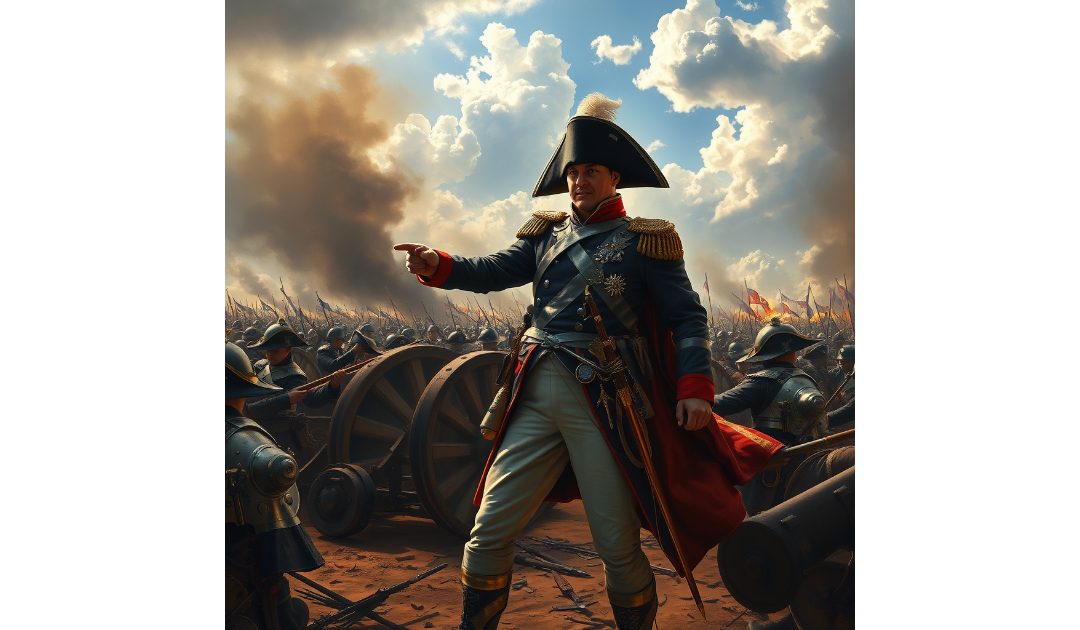On the 12th of April, 1796, Napoleon Bonaparte won his first battle as an army commander at the Battle of Montenotte. Napoleon Bonaparte, one of history’s most renowned military leaders and emperor of France, was born on the 15th of August, 1769, on the island of Corsica, then a French territory. Despite his modest beginnings, Napoleon rose to prominence as a military leader and political figure whose influence extended beyond France, impacting much of Europe.
Napoleon hailed from a minor Corsican noble family and was sent to mainland France for education. He enrolled at a military academy in Brienne and later attended the École Militaire in Paris, where he trained as an artillery officer. His military career began during the French Revolution, a period of radical political and social upheaval in France.
Napoleon’s early military successes were marked by his strategic acumen and daring tactics. One of his first significant achievements came in 1793 during the Siege of Toulon, where he played a crucial role in the recapture of the city from British and Royalist forces. His performance earned him a promotion to brigadier general at the age of 24, setting the stage for his rise.
In 1796, Napoleon was appointed commander of the French Army of Italy. His Italian campaign was a masterclass in military strategy, where he outmaneuvered larger Austrian forces and established his reputation as a brilliant commander. These victories not only expanded French territory but also increased Napoleon’s popularity and influence back home.
The next few years saw Napoleon’s ambitions grow. In 1798, he led a campaign in Egypt aimed at undermining British trade routes to India. Although the campaign had mixed results and ended in an eventual retreat, it showcased his ability to think beyond European theatres of war and introduced the Rosetta Stone to the wider world, which would later be key to deciphering Egyptian hieroglyphs.
Napoleon returned to France in 1799 amid political instability. He seized the opportunity to stage a coup d’état on 18 Brumaire (9th of November 1799) and established himself as First Consul of France, effectively placing him at the helm of the French government. His domestic policies were as impactful as his military campaigns; he reformed the French education system, established the Napoleonic Code (a legal framework that influenced civil law codes worldwide), and centralized the administrative structure.
In 1804, Napoleon crowned himself Emperor of the French, consolidating his power even further. His reign saw a series of military campaigns, known collectively as the Napoleonic Wars, which involved complex alliances and conflicts across Europe. His victories at battles such as Austerlitz in 1805 against the Austrians and Russians cemented his reputation as one of the greatest military tacticians in history.
However, Napoleon’s ambitions led to overstretch. The Peninsular War against Spain and Portugal and the invasion of Russia in 1812 were turning points that began to unravel his empire. The Russian campaign was disastrous; the harsh winter and scorched earth tactics employed by the Russians decimated his Grande Armée.
In 1814, after a series of defeats by the Sixth Coalition, Napoleon was forced to abdicate and was exiled to the island of Elba. However, he famously escaped in 1815 and returned to power for a brief period known as the Hundred Days. His return ended with his defeat at the Battle of Waterloo on the 18th of June 1815, after which he was exiled to the remote island of Saint Helena in the South Atlantic, where he lived until his death on the 5th of May 1821.
Napoleon’s legacy is complex. On one hand, he is remembered for his military genius and the vast expansion of the French Empire under his rule. On the other, his ambition led to years of conflict and loss of life. Yet, his reforms in law, military organization, and education had lasting impacts. The Napoleonic Code influenced legal systems around the world, and his emphasis on meritocracy inspired future generations.
Napoleon remains a figure of great interest, both criticised and admired, symbolising the duality of human ambition and vision. His life, with its dramatic ascents and falls, continues to inspire and caution, representing a pivotal era in European history.

